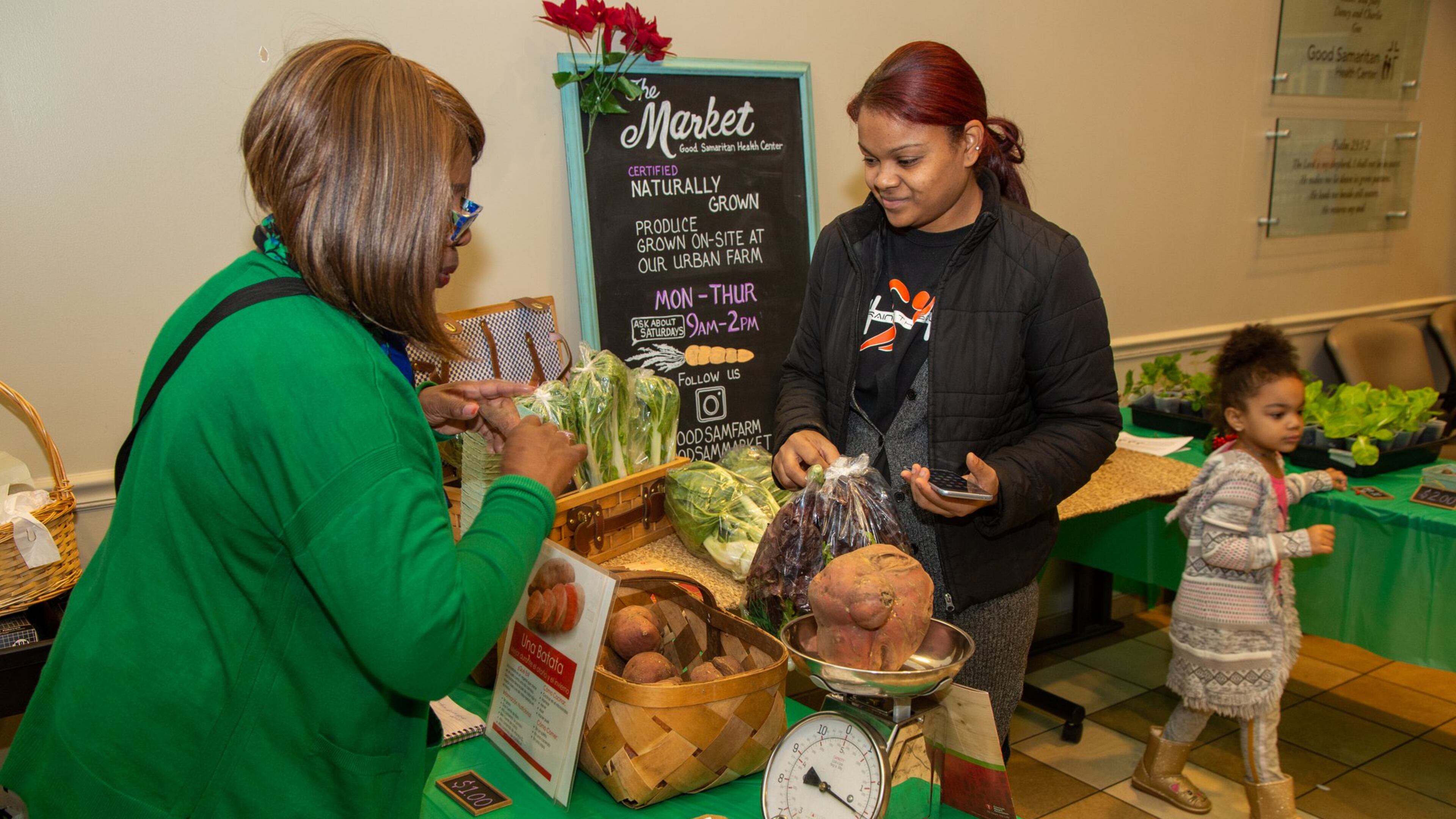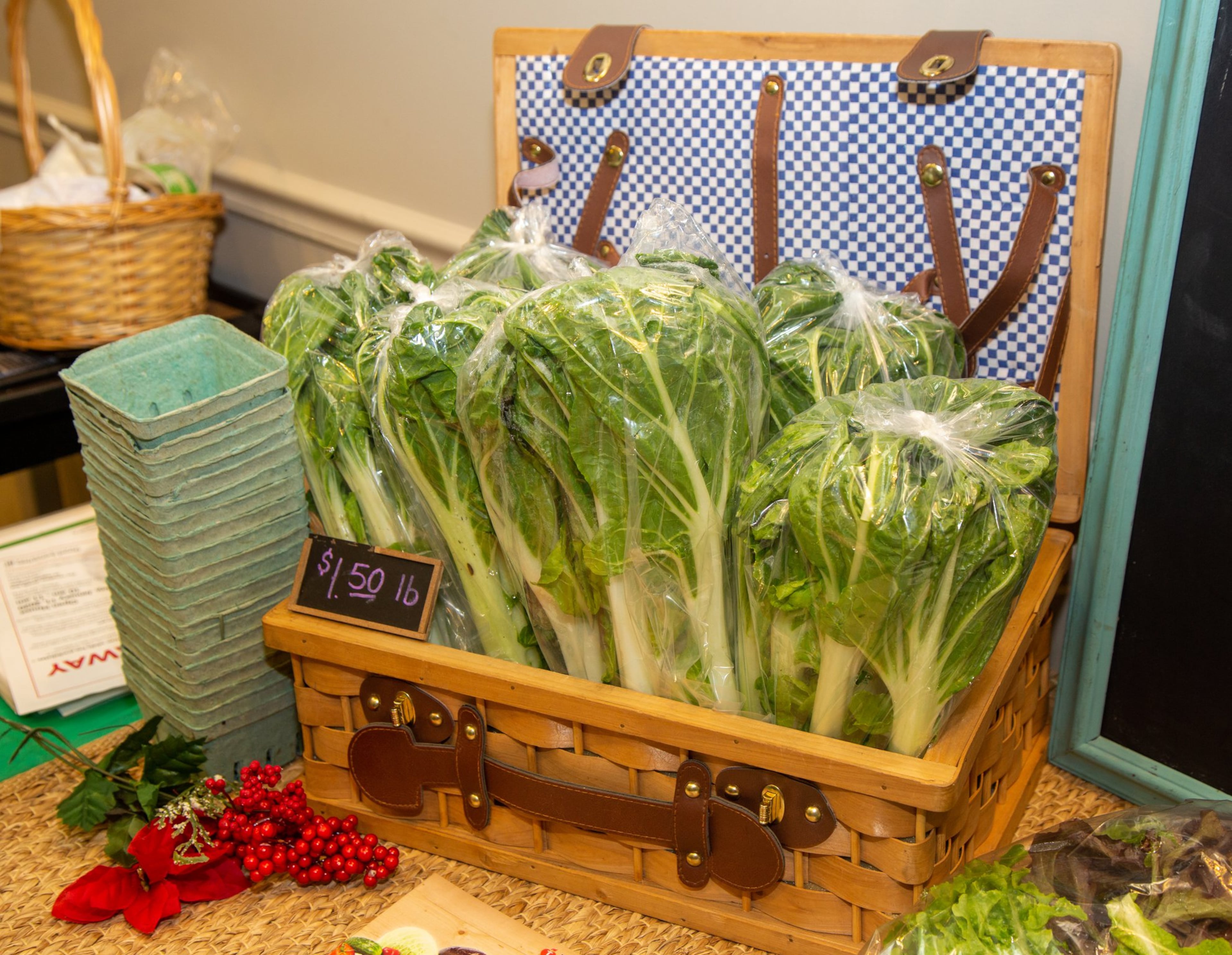Farm at Good Samaritan Health Center offers food, community as medicine

Nobie Muhl braved the wind and rain that signal the approach of winter in metro Atlanta to tend to the strawberries, onions and garlic growing on 1 acre of land just off Donald Lee Hollowell Parkway in Bankhead. As full-time farmers at Good Samaritan Health Center, Muhl, 33, and Alexis Haggerty, 25, didn’t let the dreary weather dampen their enthusiasm for making sure patients at the center have access to fresh produce almost all year round.
At the center, clients waiting for appointments browsed tabletops filled with an assortment of fruits, vegetables and nuts including strawberry plants, pecans and a variety of greens, all of which were priced at $1 or $2. Anileidi Gomez, 31, examined giant sweet potatoes, a favorite of her four children, as Market manager Loren Ferguson offered a recipe for slow cooker sweet potato soup printed in English and Spanish.
“It’s awesome. I always shop here when we come,” said Connie Lotze, 62, who drives over an hour from North Georgia to bring Jim Nelson, 60, to his appointments at the health center. She helped Nelson, who doesn’t have insurance, find the center years ago, and while they don’t come often, the Market is a highlight when they do. Lotze said she had never seen a health clinic with its very own farm and market.

By most accounts, neither has anyone else.
Good Samaritan, the nonprofit health center founded 20 years ago by Dr. Bill Warren, has provided medical, dental, mental health, specialty, and health education services to Atlanta families and individuals who are not able to afford it. Since 2014, when the farm began operating, they have also offered clients a place where healthy foods are available at least 10 months out of the year at prices they can afford. As the farm grows more established and continues to earn community trust, Muhl hopes it will also become a greater source of social interaction and engagement both within and beyond the confines of Good Sam.
Growth of urban farms
Urban farming has boomed in metro Atlanta over the past two decades. There are 52 urban farms in metro Atlanta and about 300 community gardens, according to Wholesome Wave Georgia, an organization dedicated to helping Georgians access locally grown food. With 36% of the city designated a food desert (an area with limited access to affordable, healthy foods) in 2017, according to the U.S. Department of Agriculture, a number of farms and gardens in the area have the mission of feeding the underserved. Succeeding at that mission can be challenging without partnerships or collaborations with other organizations.
>> RELATED | Emory partnership will help preserve farmland, boost local food system
The link between the prevalence of food deserts and diet-related illnesses has been well established, prompting more health-focused organizations and government agencies to focus on addressing food insecurity by partnering with local farms.
Atlanta Mayor Keisha Lance Bottoms set the goal of putting 85% of residents within a half-mile of fresh food by 2022, according to the city's website. The city recently approved an ordinance to acquire about 7 acres of land to create the Urban Food Forest at Browns Mill, the largest urban food forest in the nation, which allows visitors to pick fresh fruit and vegetables right from the property free of charge.
>> RELATED | Meet the Atlanta man who's a trailblazer in urban farming
Farm-to-health care collaborations are also growing in metro Atlanta. Good Sam’s unique system, which connects the growing, distribution and consumption of fresh foods, was highlighted in the 2017 Atlanta’s Local Food Baseline Report from the Food Well Alliance, a network of local leaders who work to build successful community gardens and urban farms. “There are two types of food issues — lack of food quantity and lack of food quality. In Good Sam’s neighborhood it’s not so much a lack of quantity as it is a lack of quality. As a doctor, how can I ask my patients to eat more fresh fruits and vegetables if they can’t access them in their community? This is why we added an urban farm — because nutrition is critical for overall health,” said Warren, who was quoted in the report.

In 2019, the farm at Good Sam produced about 10,000 pounds of crops for its on-site farmers market, said John Allison, director of development and marketing. The Market serves Good Sam clients who participate in a special program with Wholesome Wave Georgia, as well as the larger community.
Clients of Good Sam who qualify for Wholesome Wave’s Georgia Food for Health program receive food prescriptions from doctors to redeem at the Market to receive free produce. Program participants must live in a food-insecure area and have a diet-related illness such as diabetes, obesity and heart disease. In addition to fresh produce, program participants also attend cooking classes to show them how to prepare foods like butternut squash or kale in new and healthier ways.
It is one of the first programs in the Southeast to adopt the food as medicine approach, said Will Sellers, executive director of Wholesome Wave. The program began in 2015 as a pilot at a health clinic in Augusta before being introduced to metro Atlanta. Since 2016, the program has enrolled 208 participants, and in 2017, 70% of patients reported improved health, 60% reported having a greater support system because of the community building that is part of the program, and 85% reported being satisfied with the program, Sellers said.
In addition to Good Sam, patients at Grady Hospital and Harrisburg Family Health Care Clinic in Augusta also participate in the food prescription program. Wholesome Wave expects to have a partnership with an additional health care center in Athens later this year, Sellers said.
‘A conscious decision’
Good Sam has proved to be a trailblazer. “What makes Good Sam unique is that they have the market on-site and the urban farm to which they devote resources to having farm managers,” Sellers said. “Good Sam could have expanded their campus to create more buildings, but they made a conscious decision to have a farm.”

While the Food for Health program runs only from May to October, Good Sam offers up fresh produce to clients for most of the year. Rose bushes and pomegranate trees surround the entrance of the farm, where 36 different varieties of fruits and vegetables are grown in any given year. The farm is certified naturally grown, a grassroots alternative to certified organic. Staples such as kale, collards and spicy greens are grown alongside test items such as loofah, which sits drying in the greenhouse, and peaches that didn’t harvest so well this season.
Muhl worked in human resources before her sister-in-law introduced her to urban farming. She would later get a summer job harvesting blueberries, and in 2016, she began working at Good Sam. In 2018, she took over farm operations.
One of her first tasks was to figure out what types of produce customers want by tracking how much produce is sold in the Market. In January, she and Haggerty look at spreadsheets outlining what they grew and how much of it sold to make decisions about what to plant for the coming year. It’s a process Muhl calls “Sudoku for veggies.”

Okra, for example, is a crowd-pleaser and a hardy plant, but it is time-consuming to harvest. With a daily market to fill, it isn’t practical for two farmers and their occasional volunteers to spend the time harvesting okra, and this season they grew too much, Muhl said.
A connection with locals
As unique as the farm itself are some of its challenges. This past spring was the first time they did not lose some of the crops to theft, Muhl said, recalling the time an entire crop of collard greens was swiped from the farm and resold on the streets.
It is a sign, possibly, of growing trust in the community. As Good Sam clients and local residents become more familiar with the farm and the Market, Muhl hopes the farm will serve not just as a resource for fresh food but as a gathering place where locals engage with each other and the land.

Muhl and Haggerty have begun to enhance the aesthetics of the farm — adding seating and pathways — to create an inviting space where patients and residents will want to come to sit and explore. An outdoor pavilion is under construction, and upon completion, it will become the new location for the Market.
A community garden located alongside the farm is also a consideration for the future to help locals develop a deeper connection to farming, Muhl said, as well as a mobile unit that would expose the broader community to the good food and goodwill that has been growing for years at Good Sam.


